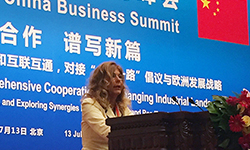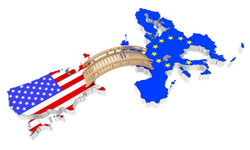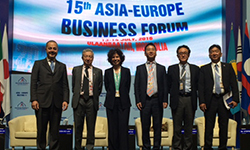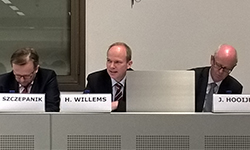BusinessEurope Headlines No. 2016-26
President Marcegaglia calls upon the EU and China to seize opportunities for growth
 "China and the EU are indispensable and mature partners who should treat each other respectfully, on the basis of reciprocity, and speak directly and honestly with each other", Emma Marcegaglia, President of BusinessEurope said at the 11th EU-China Business Summit in Beijing. "There are numerous global challenges which affect both Europe and China, and tackling these global challenges begins at home, with sound policies to create sustainable and prosperous societies." President Marcegaglia continued by saying that "this requires a reduction of overcapacity affecting many industries, improved and reciprocal market access, and collaboration on multilateral issues such as digital trade and the implementation of the COP21 agreement."
"China and the EU are indispensable and mature partners who should treat each other respectfully, on the basis of reciprocity, and speak directly and honestly with each other", Emma Marcegaglia, President of BusinessEurope said at the 11th EU-China Business Summit in Beijing. "There are numerous global challenges which affect both Europe and China, and tackling these global challenges begins at home, with sound policies to create sustainable and prosperous societies." President Marcegaglia continued by saying that "this requires a reduction of overcapacity affecting many industries, improved and reciprocal market access, and collaboration on multilateral issues such as digital trade and the implementation of the COP21 agreement."
Contact: Maurice Fermont
Hard or soft approach when enforcing sustainable development chapter in TTIP?
 When it comes to enforcement of sustainable development provisions, “what evidence can be offered that a ‘hard approach’ that ultimately also envisages the possibility of imposing sanctions is more effective than a ‘soft approach’ based on consultations?” This was a key point Eleonora Catella raised at the TTIP stakeholders’ event organised on 13 July in Brussels, in the week of the 14th round of negotiations. Experience from previous trade agreements has demonstrated that monitoring by independent and representative civil society organisations is only the first step towards enforcement. Another important aspect is how to trigger the next steps in case violations of provisions are reported, and this trigger is a key element of enforcement, whether a ‘soft’ or a ‘hard’ approach is adopted.
When it comes to enforcement of sustainable development provisions, “what evidence can be offered that a ‘hard approach’ that ultimately also envisages the possibility of imposing sanctions is more effective than a ‘soft approach’ based on consultations?” This was a key point Eleonora Catella raised at the TTIP stakeholders’ event organised on 13 July in Brussels, in the week of the 14th round of negotiations. Experience from previous trade agreements has demonstrated that monitoring by independent and representative civil society organisations is only the first step towards enforcement. Another important aspect is how to trigger the next steps in case violations of provisions are reported, and this trigger is a key element of enforcement, whether a ‘soft’ or a ‘hard’ approach is adopted.
Contact: Eleonora Catella
Setting out our concerns regarding a European Unemployment Benefits Scheme
 “A proposal on a European Unemployment Benefits Scheme should be seen in the context of the need to improve convergence between euro area members and improve macroeconomic stability. EU Member States could do a lot themselves to help achieve these goals by undertaking structural reforms (particularly in labour markets) and strengthening their public finances.” said James Watson BusinessEurope’s Economics Director, at a conference organised by the think tank CEPS on 11 July 2016. As noted in BusinessEurope’s position paper on the ‘5 Presidents’ report on EMU, BusinessEurope believes a Euro Area fiscal capacity or stabilisation fund is necessary for the long-term stability of EMU. However, any such scheme needs to avoid reducing the incentives for individual EU Member States to undertake structural reforms – a key concern regarding proposals for a common unemployment benefits scheme. In contrast, completing the banking and capital markets union can support stability in the euro area by increasing the flow of both public and private funds between Member States.
“A proposal on a European Unemployment Benefits Scheme should be seen in the context of the need to improve convergence between euro area members and improve macroeconomic stability. EU Member States could do a lot themselves to help achieve these goals by undertaking structural reforms (particularly in labour markets) and strengthening their public finances.” said James Watson BusinessEurope’s Economics Director, at a conference organised by the think tank CEPS on 11 July 2016. As noted in BusinessEurope’s position paper on the ‘5 Presidents’ report on EMU, BusinessEurope believes a Euro Area fiscal capacity or stabilisation fund is necessary for the long-term stability of EMU. However, any such scheme needs to avoid reducing the incentives for individual EU Member States to undertake structural reforms – a key concern regarding proposals for a common unemployment benefits scheme. In contrast, completing the banking and capital markets union can support stability in the euro area by increasing the flow of both public and private funds between Member States.
Read more or contact: James Watson
Is there a role for capacity mechanisms in Europe’s power markets?
 EU Member States are already implementing or considering national rules to secure that the electricity system has sufficient capacity available to meet the electricity demand at all times, the so-called “capacity mechanisms”. Like any regulatory intervention, those have risks associated. It is therefore crucial that Member States and the European Commission work together to ensure other options are exhausted before capacity mechanisms are pursued. A patchwork of capacity mechanisms could further compromise the internal energy market and lead to fragmentation. These were among the key messages in BusinessEurope’s response to the public consultation on state aid sector inquiry into capacity mechanisms. Beside the issue of eligibility and suitable design, the costs and possible impact of capacity mechanisms on industrial consumers also need to be sufficiently analysed and duly considered, BusinessEurope underlined.
EU Member States are already implementing or considering national rules to secure that the electricity system has sufficient capacity available to meet the electricity demand at all times, the so-called “capacity mechanisms”. Like any regulatory intervention, those have risks associated. It is therefore crucial that Member States and the European Commission work together to ensure other options are exhausted before capacity mechanisms are pursued. A patchwork of capacity mechanisms could further compromise the internal energy market and lead to fragmentation. These were among the key messages in BusinessEurope’s response to the public consultation on state aid sector inquiry into capacity mechanisms. Beside the issue of eligibility and suitable design, the costs and possible impact of capacity mechanisms on industrial consumers also need to be sufficiently analysed and duly considered, BusinessEurope underlined.
Read more or contact: Jan Bambas
Achieving better integration of SMEs in Global Value Chains
 “Small and medium sized enterprises (SMEs) are the backbone of the global economy. Increasing their participation in Global Value Chains (GVCs) means growth and employment”, argued Mrs Luisa Santos, BusinessEurope Director for International Relations during her intervention at the 15th Asia-Europe Business Forum, organised in Ulaanbaatar, Mongolia, 13 and 14 July. “Economies in Asia – developed, emerging or developing – should support their SMEs to effectively integrate in GVCs, by creating the right business environment, conducive to the development and diversification of SMEs. Here, the work of international institutions such as the OECD and the WTO can provide useful guidance”, concluded Santos. Over the past 20 years, the digital revolution has led to a world that is better connected and to the emergence of Global Value Chains. That means new opportunities for businesses. But many GVCs are outside traditional markets, which can be challenging for SMEs. They need to adapt to a new global trading and production reality, increase their skills and build their capacity.
“Small and medium sized enterprises (SMEs) are the backbone of the global economy. Increasing their participation in Global Value Chains (GVCs) means growth and employment”, argued Mrs Luisa Santos, BusinessEurope Director for International Relations during her intervention at the 15th Asia-Europe Business Forum, organised in Ulaanbaatar, Mongolia, 13 and 14 July. “Economies in Asia – developed, emerging or developing – should support their SMEs to effectively integrate in GVCs, by creating the right business environment, conducive to the development and diversification of SMEs. Here, the work of international institutions such as the OECD and the WTO can provide useful guidance”, concluded Santos. Over the past 20 years, the digital revolution has led to a world that is better connected and to the emergence of Global Value Chains. That means new opportunities for businesses. But many GVCs are outside traditional markets, which can be challenging for SMEs. They need to adapt to a new global trading and production reality, increase their skills and build their capacity.
Contact: Luisa Santos or Sofia Bournou
Towards an effective EU insolvency framework
 BusinessEurope supports the idea of a second chance at EU level. Insolvencies affect 200,000 companies a year in the EU and 1/4 of those have a cross border impact. The right incentives need to be there to help struggling businesses to recover successfully and bring down the stigma of failure. Given how insolvency is so deeply rooted in national legal traditions, BusinessEurope advocates for a targeted approach. Focus should be put on restructuring and recovery procedures rather than liquidation. These were the messages conveyed by Heiko Willems, Chair of BusinessEurope’s Legal Affairs Committee, during the conference Slovak Presidency Convergence of insolvency frameworks within the EU on 12 July.
BusinessEurope supports the idea of a second chance at EU level. Insolvencies affect 200,000 companies a year in the EU and 1/4 of those have a cross border impact. The right incentives need to be there to help struggling businesses to recover successfully and bring down the stigma of failure. Given how insolvency is so deeply rooted in national legal traditions, BusinessEurope advocates for a targeted approach. Focus should be put on restructuring and recovery procedures rather than liquidation. These were the messages conveyed by Heiko Willems, Chair of BusinessEurope’s Legal Affairs Committee, during the conference Slovak Presidency Convergence of insolvency frameworks within the EU on 12 July.
Read more or contact: Pedro Oliveira
Calendar
 11-15 July 2016: 14th TTIP Negotiation Round in Brussels
11-15 July 2016: 14th TTIP Negotiation Round in Brussels- 20 July 2016: 2nd College orientation debate on China-Market Economy Status in Brussels